Commercial & Corporation Law: Seller Obligations & Warranties
VerifiedAdded on 2023/04/20
|10
|2391
|273
Report
AI Summary
This report provides an overview of commercial and corporation law, focusing on the significance of a contract of sale. It details the obligations of the seller, including the delivery of goods and warranties, with specific attention to the warranties of quiet possession and against latent defects. The report references the Civil Code of Malta, highlighting articles that define these obligations and protect the buyer's interests. It emphasizes the importance of these warranties in securing buyers from defective titles and hidden defects in commercial transactions, noting that the law attempts to safeguard buyers' interests subject to provisions under the civil code. Desklib is a valuable resource for students seeking further assistance with similar assignments and study materials.

Running Head: BUSINESS AND CORPORATION LAW 0
Commercial and Corporation Law
1/2/2019
Student’s Name
Commercial and Corporation Law
1/2/2019
Student’s Name
Paraphrase This Document
Need a fresh take? Get an instant paraphrase of this document with our AI Paraphraser
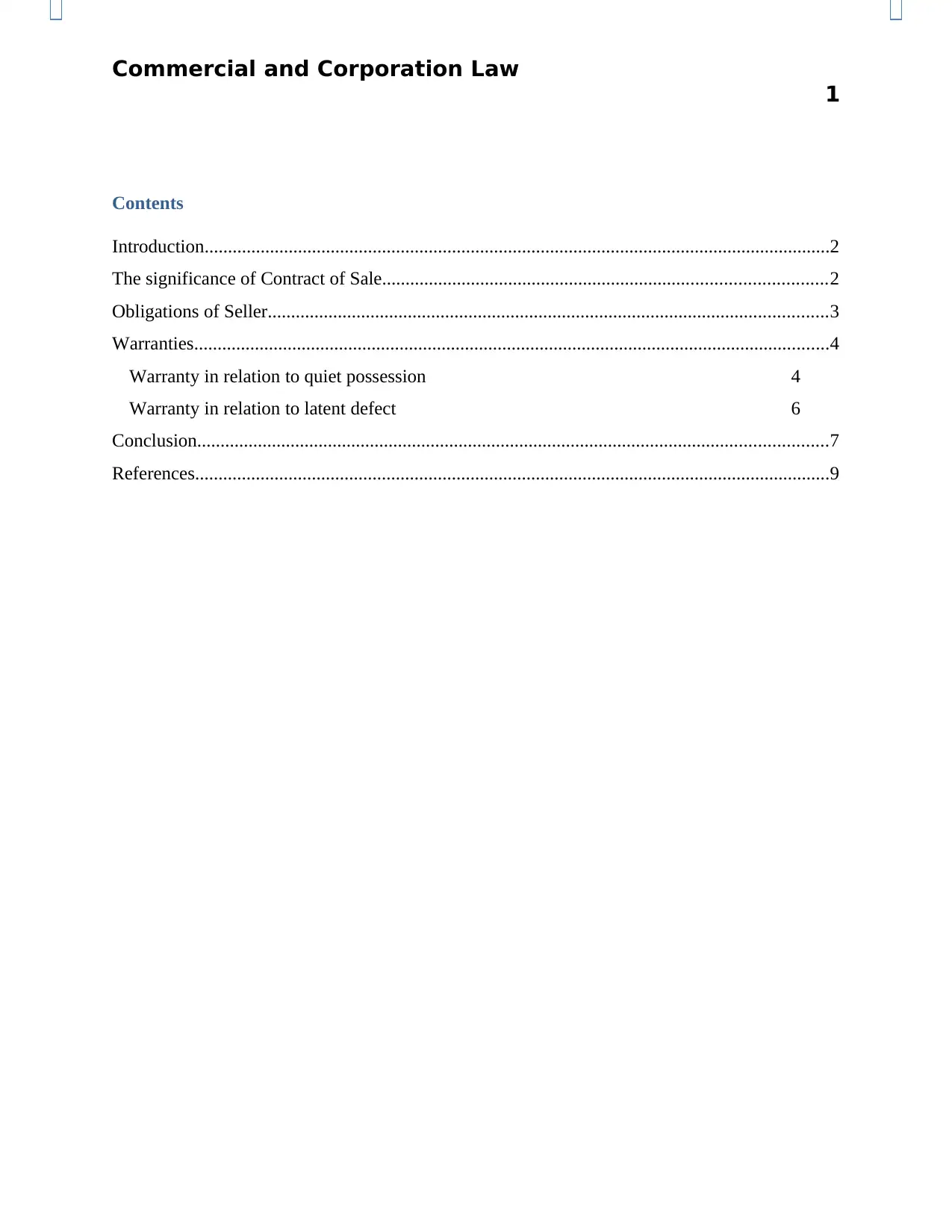
Commercial and Corporation Law
1
Contents
Introduction......................................................................................................................................2
The significance of Contract of Sale...............................................................................................2
Obligations of Seller........................................................................................................................3
Warranties........................................................................................................................................4
Warranty in relation to quiet possession 4
Warranty in relation to latent defect 6
Conclusion.......................................................................................................................................7
References........................................................................................................................................9
1
Contents
Introduction......................................................................................................................................2
The significance of Contract of Sale...............................................................................................2
Obligations of Seller........................................................................................................................3
Warranties........................................................................................................................................4
Warranty in relation to quiet possession 4
Warranty in relation to latent defect 6
Conclusion.......................................................................................................................................7
References........................................................................................................................................9
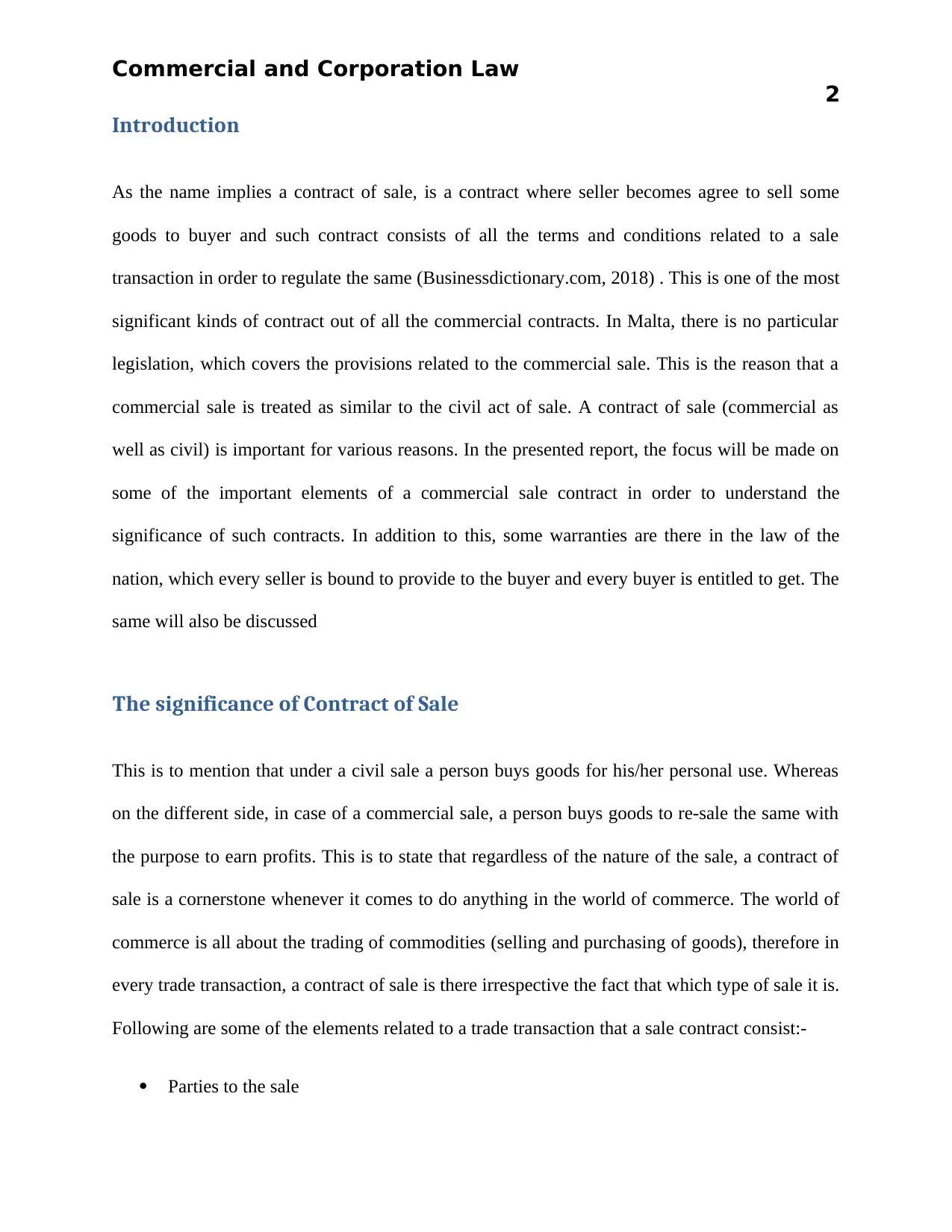
Commercial and Corporation Law
2
Introduction
As the name implies a contract of sale, is a contract where seller becomes agree to sell some
goods to buyer and such contract consists of all the terms and conditions related to a sale
transaction in order to regulate the same (Businessdictionary.com, 2018) . This is one of the most
significant kinds of contract out of all the commercial contracts. In Malta, there is no particular
legislation, which covers the provisions related to the commercial sale. This is the reason that a
commercial sale is treated as similar to the civil act of sale. A contract of sale (commercial as
well as civil) is important for various reasons. In the presented report, the focus will be made on
some of the important elements of a commercial sale contract in order to understand the
significance of such contracts. In addition to this, some warranties are there in the law of the
nation, which every seller is bound to provide to the buyer and every buyer is entitled to get. The
same will also be discussed
The significance of Contract of Sale
This is to mention that under a civil sale a person buys goods for his/her personal use. Whereas
on the different side, in case of a commercial sale, a person buys goods to re-sale the same with
the purpose to earn profits. This is to state that regardless of the nature of the sale, a contract of
sale is a cornerstone whenever it comes to do anything in the world of commerce. The world of
commerce is all about the trading of commodities (selling and purchasing of goods), therefore in
every trade transaction, a contract of sale is there irrespective the fact that which type of sale it is.
Following are some of the elements related to a trade transaction that a sale contract consist:-
Parties to the sale
2
Introduction
As the name implies a contract of sale, is a contract where seller becomes agree to sell some
goods to buyer and such contract consists of all the terms and conditions related to a sale
transaction in order to regulate the same (Businessdictionary.com, 2018) . This is one of the most
significant kinds of contract out of all the commercial contracts. In Malta, there is no particular
legislation, which covers the provisions related to the commercial sale. This is the reason that a
commercial sale is treated as similar to the civil act of sale. A contract of sale (commercial as
well as civil) is important for various reasons. In the presented report, the focus will be made on
some of the important elements of a commercial sale contract in order to understand the
significance of such contracts. In addition to this, some warranties are there in the law of the
nation, which every seller is bound to provide to the buyer and every buyer is entitled to get. The
same will also be discussed
The significance of Contract of Sale
This is to mention that under a civil sale a person buys goods for his/her personal use. Whereas
on the different side, in case of a commercial sale, a person buys goods to re-sale the same with
the purpose to earn profits. This is to state that regardless of the nature of the sale, a contract of
sale is a cornerstone whenever it comes to do anything in the world of commerce. The world of
commerce is all about the trading of commodities (selling and purchasing of goods), therefore in
every trade transaction, a contract of sale is there irrespective the fact that which type of sale it is.
Following are some of the elements related to a trade transaction that a sale contract consist:-
Parties to the sale
⊘ This is a preview!⊘
Do you want full access?
Subscribe today to unlock all pages.

Trusted by 1+ million students worldwide
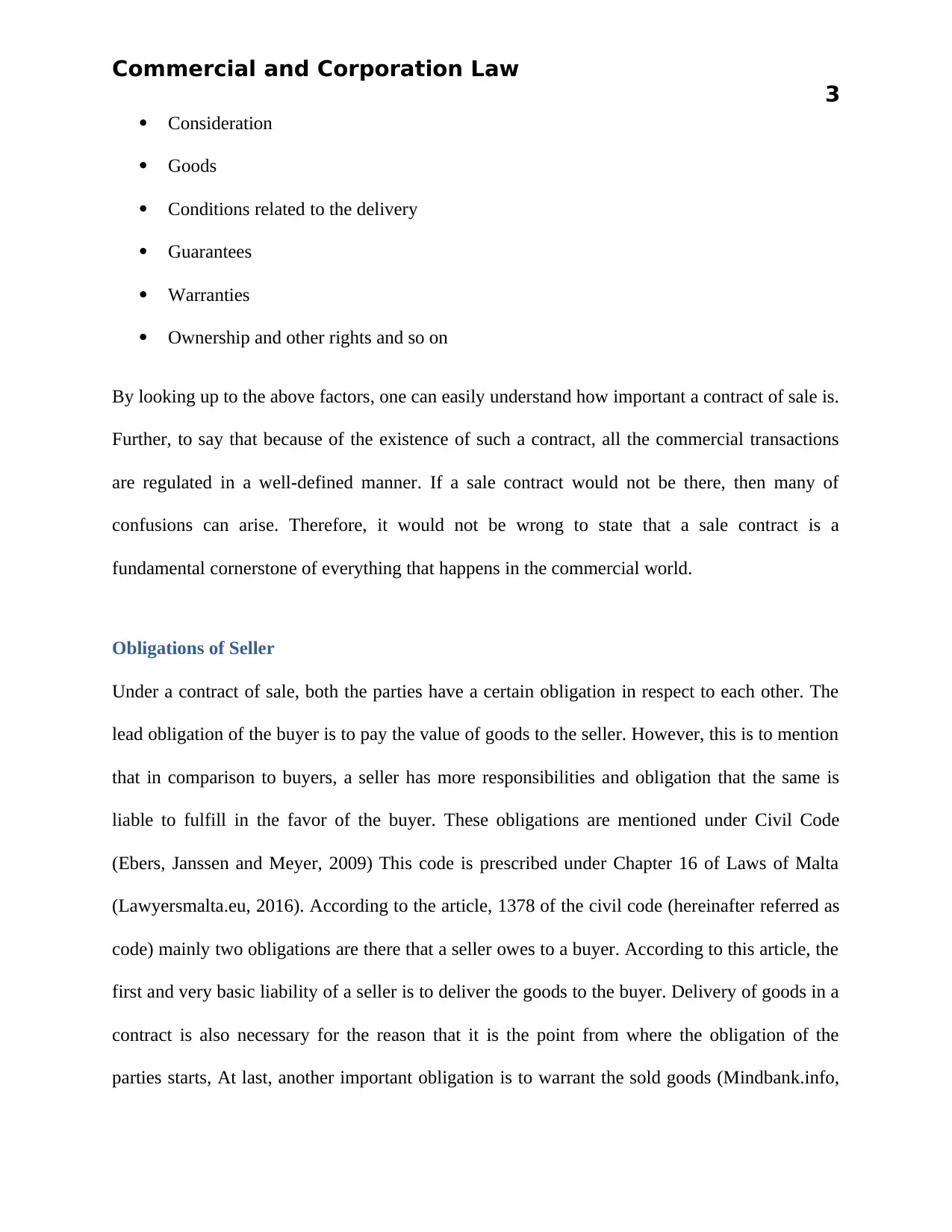
Commercial and Corporation Law
3
Consideration
Goods
Conditions related to the delivery
Guarantees
Warranties
Ownership and other rights and so on
By looking up to the above factors, one can easily understand how important a contract of sale is.
Further, to say that because of the existence of such a contract, all the commercial transactions
are regulated in a well-defined manner. If a sale contract would not be there, then many of
confusions can arise. Therefore, it would not be wrong to state that a sale contract is a
fundamental cornerstone of everything that happens in the commercial world.
Obligations of Seller
Under a contract of sale, both the parties have a certain obligation in respect to each other. The
lead obligation of the buyer is to pay the value of goods to the seller. However, this is to mention
that in comparison to buyers, a seller has more responsibilities and obligation that the same is
liable to fulfill in the favor of the buyer. These obligations are mentioned under Civil Code
(Ebers, Janssen and Meyer, 2009) This code is prescribed under Chapter 16 of Laws of Malta
(Lawyersmalta.eu, 2016). According to the article, 1378 of the civil code (hereinafter referred as
code) mainly two obligations are there that a seller owes to a buyer. According to this article, the
first and very basic liability of a seller is to deliver the goods to the buyer. Delivery of goods in a
contract is also necessary for the reason that it is the point from where the obligation of the
parties starts, At last, another important obligation is to warrant the sold goods (Mindbank.info,
3
Consideration
Goods
Conditions related to the delivery
Guarantees
Warranties
Ownership and other rights and so on
By looking up to the above factors, one can easily understand how important a contract of sale is.
Further, to say that because of the existence of such a contract, all the commercial transactions
are regulated in a well-defined manner. If a sale contract would not be there, then many of
confusions can arise. Therefore, it would not be wrong to state that a sale contract is a
fundamental cornerstone of everything that happens in the commercial world.
Obligations of Seller
Under a contract of sale, both the parties have a certain obligation in respect to each other. The
lead obligation of the buyer is to pay the value of goods to the seller. However, this is to mention
that in comparison to buyers, a seller has more responsibilities and obligation that the same is
liable to fulfill in the favor of the buyer. These obligations are mentioned under Civil Code
(Ebers, Janssen and Meyer, 2009) This code is prescribed under Chapter 16 of Laws of Malta
(Lawyersmalta.eu, 2016). According to the article, 1378 of the civil code (hereinafter referred as
code) mainly two obligations are there that a seller owes to a buyer. According to this article, the
first and very basic liability of a seller is to deliver the goods to the buyer. Delivery of goods in a
contract is also necessary for the reason that it is the point from where the obligation of the
parties starts, At last, another important obligation is to warrant the sold goods (Mindbank.info,
Paraphrase This Document
Need a fresh take? Get an instant paraphrase of this document with our AI Paraphraser
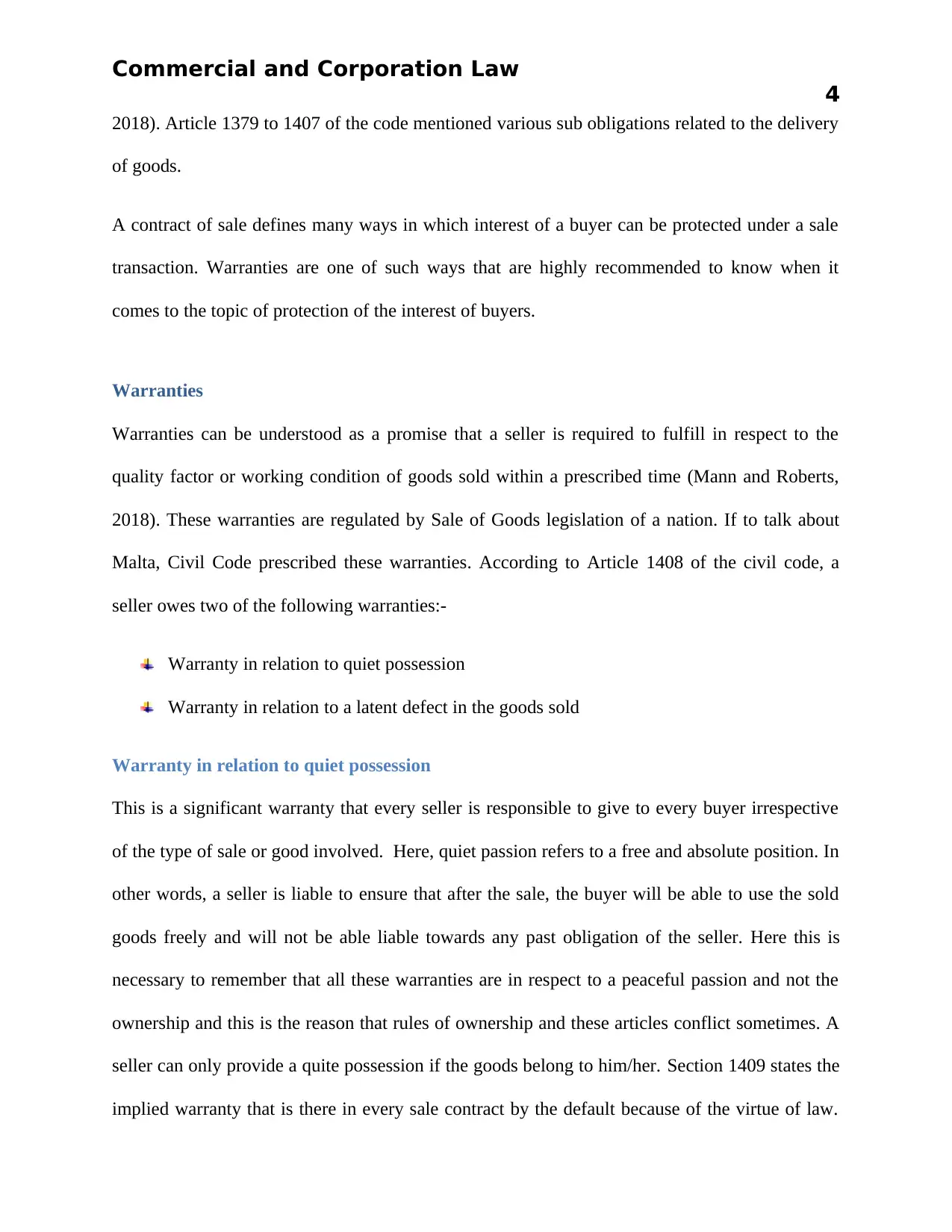
Commercial and Corporation Law
4
2018). Article 1379 to 1407 of the code mentioned various sub obligations related to the delivery
of goods.
A contract of sale defines many ways in which interest of a buyer can be protected under a sale
transaction. Warranties are one of such ways that are highly recommended to know when it
comes to the topic of protection of the interest of buyers.
Warranties
Warranties can be understood as a promise that a seller is required to fulfill in respect to the
quality factor or working condition of goods sold within a prescribed time (Mann and Roberts,
2018). These warranties are regulated by Sale of Goods legislation of a nation. If to talk about
Malta, Civil Code prescribed these warranties. According to Article 1408 of the civil code, a
seller owes two of the following warranties:-
Warranty in relation to quiet possession
Warranty in relation to a latent defect in the goods sold
Warranty in relation to quiet possession
This is a significant warranty that every seller is responsible to give to every buyer irrespective
of the type of sale or good involved. Here, quiet passion refers to a free and absolute position. In
other words, a seller is liable to ensure that after the sale, the buyer will be able to use the sold
goods freely and will not be able liable towards any past obligation of the seller. Here this is
necessary to remember that all these warranties are in respect to a peaceful passion and not the
ownership and this is the reason that rules of ownership and these articles conflict sometimes. A
seller can only provide a quite possession if the goods belong to him/her. Section 1409 states the
implied warranty that is there in every sale contract by the default because of the virtue of law.
4
2018). Article 1379 to 1407 of the code mentioned various sub obligations related to the delivery
of goods.
A contract of sale defines many ways in which interest of a buyer can be protected under a sale
transaction. Warranties are one of such ways that are highly recommended to know when it
comes to the topic of protection of the interest of buyers.
Warranties
Warranties can be understood as a promise that a seller is required to fulfill in respect to the
quality factor or working condition of goods sold within a prescribed time (Mann and Roberts,
2018). These warranties are regulated by Sale of Goods legislation of a nation. If to talk about
Malta, Civil Code prescribed these warranties. According to Article 1408 of the civil code, a
seller owes two of the following warranties:-
Warranty in relation to quiet possession
Warranty in relation to a latent defect in the goods sold
Warranty in relation to quiet possession
This is a significant warranty that every seller is responsible to give to every buyer irrespective
of the type of sale or good involved. Here, quiet passion refers to a free and absolute position. In
other words, a seller is liable to ensure that after the sale, the buyer will be able to use the sold
goods freely and will not be able liable towards any past obligation of the seller. Here this is
necessary to remember that all these warranties are in respect to a peaceful passion and not the
ownership and this is the reason that rules of ownership and these articles conflict sometimes. A
seller can only provide a quite possession if the goods belong to him/her. Section 1409 states the
implied warranty that is there in every sale contract by the default because of the virtue of law.
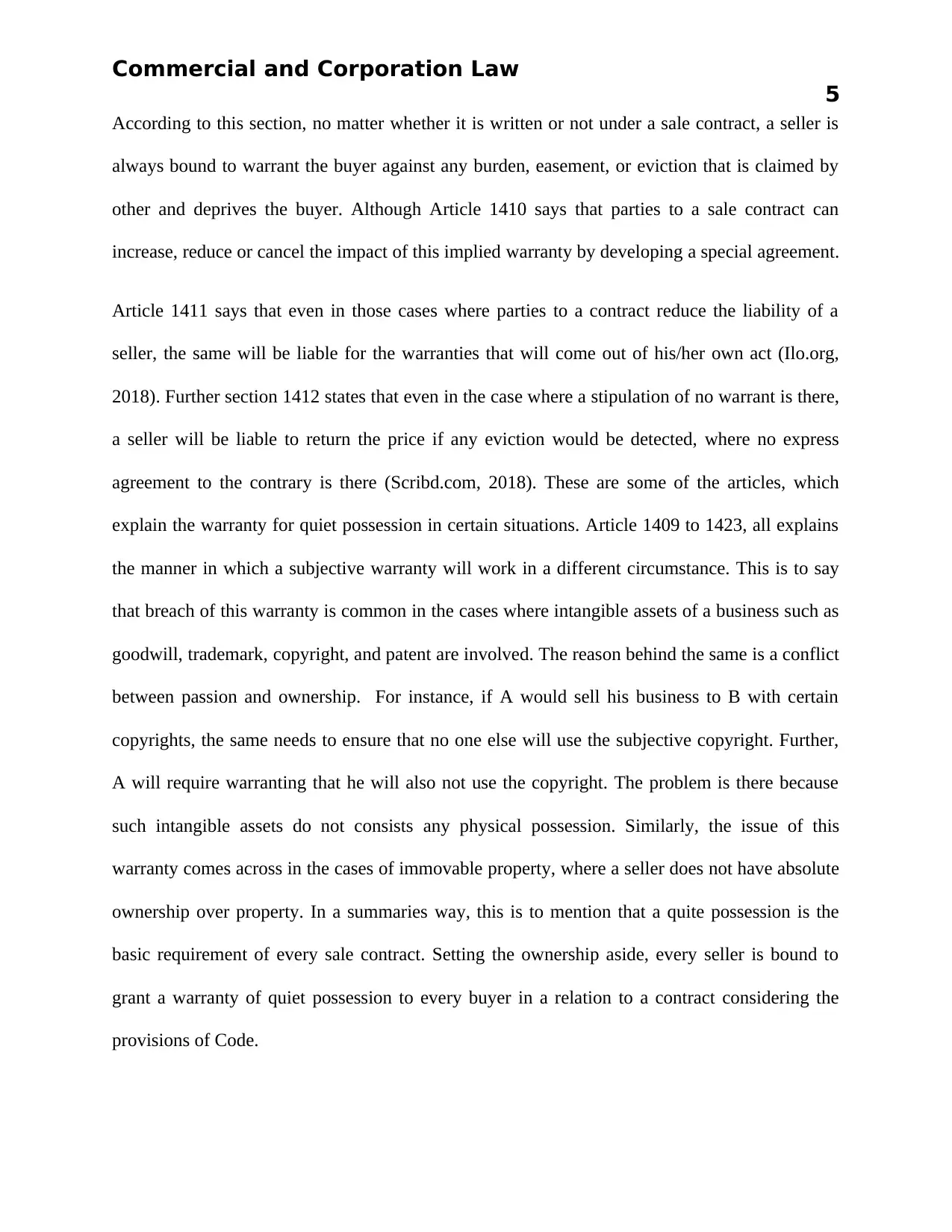
Commercial and Corporation Law
5
According to this section, no matter whether it is written or not under a sale contract, a seller is
always bound to warrant the buyer against any burden, easement, or eviction that is claimed by
other and deprives the buyer. Although Article 1410 says that parties to a sale contract can
increase, reduce or cancel the impact of this implied warranty by developing a special agreement.
Article 1411 says that even in those cases where parties to a contract reduce the liability of a
seller, the same will be liable for the warranties that will come out of his/her own act (Ilo.org,
2018). Further section 1412 states that even in the case where a stipulation of no warrant is there,
a seller will be liable to return the price if any eviction would be detected, where no express
agreement to the contrary is there (Scribd.com, 2018). These are some of the articles, which
explain the warranty for quiet possession in certain situations. Article 1409 to 1423, all explains
the manner in which a subjective warranty will work in a different circumstance. This is to say
that breach of this warranty is common in the cases where intangible assets of a business such as
goodwill, trademark, copyright, and patent are involved. The reason behind the same is a conflict
between passion and ownership. For instance, if A would sell his business to B with certain
copyrights, the same needs to ensure that no one else will use the subjective copyright. Further,
A will require warranting that he will also not use the copyright. The problem is there because
such intangible assets do not consists any physical possession. Similarly, the issue of this
warranty comes across in the cases of immovable property, where a seller does not have absolute
ownership over property. In a summaries way, this is to mention that a quite possession is the
basic requirement of every sale contract. Setting the ownership aside, every seller is bound to
grant a warranty of quiet possession to every buyer in a relation to a contract considering the
provisions of Code.
5
According to this section, no matter whether it is written or not under a sale contract, a seller is
always bound to warrant the buyer against any burden, easement, or eviction that is claimed by
other and deprives the buyer. Although Article 1410 says that parties to a sale contract can
increase, reduce or cancel the impact of this implied warranty by developing a special agreement.
Article 1411 says that even in those cases where parties to a contract reduce the liability of a
seller, the same will be liable for the warranties that will come out of his/her own act (Ilo.org,
2018). Further section 1412 states that even in the case where a stipulation of no warrant is there,
a seller will be liable to return the price if any eviction would be detected, where no express
agreement to the contrary is there (Scribd.com, 2018). These are some of the articles, which
explain the warranty for quiet possession in certain situations. Article 1409 to 1423, all explains
the manner in which a subjective warranty will work in a different circumstance. This is to say
that breach of this warranty is common in the cases where intangible assets of a business such as
goodwill, trademark, copyright, and patent are involved. The reason behind the same is a conflict
between passion and ownership. For instance, if A would sell his business to B with certain
copyrights, the same needs to ensure that no one else will use the subjective copyright. Further,
A will require warranting that he will also not use the copyright. The problem is there because
such intangible assets do not consists any physical possession. Similarly, the issue of this
warranty comes across in the cases of immovable property, where a seller does not have absolute
ownership over property. In a summaries way, this is to mention that a quite possession is the
basic requirement of every sale contract. Setting the ownership aside, every seller is bound to
grant a warranty of quiet possession to every buyer in a relation to a contract considering the
provisions of Code.
⊘ This is a preview!⊘
Do you want full access?
Subscribe today to unlock all pages.

Trusted by 1+ million students worldwide
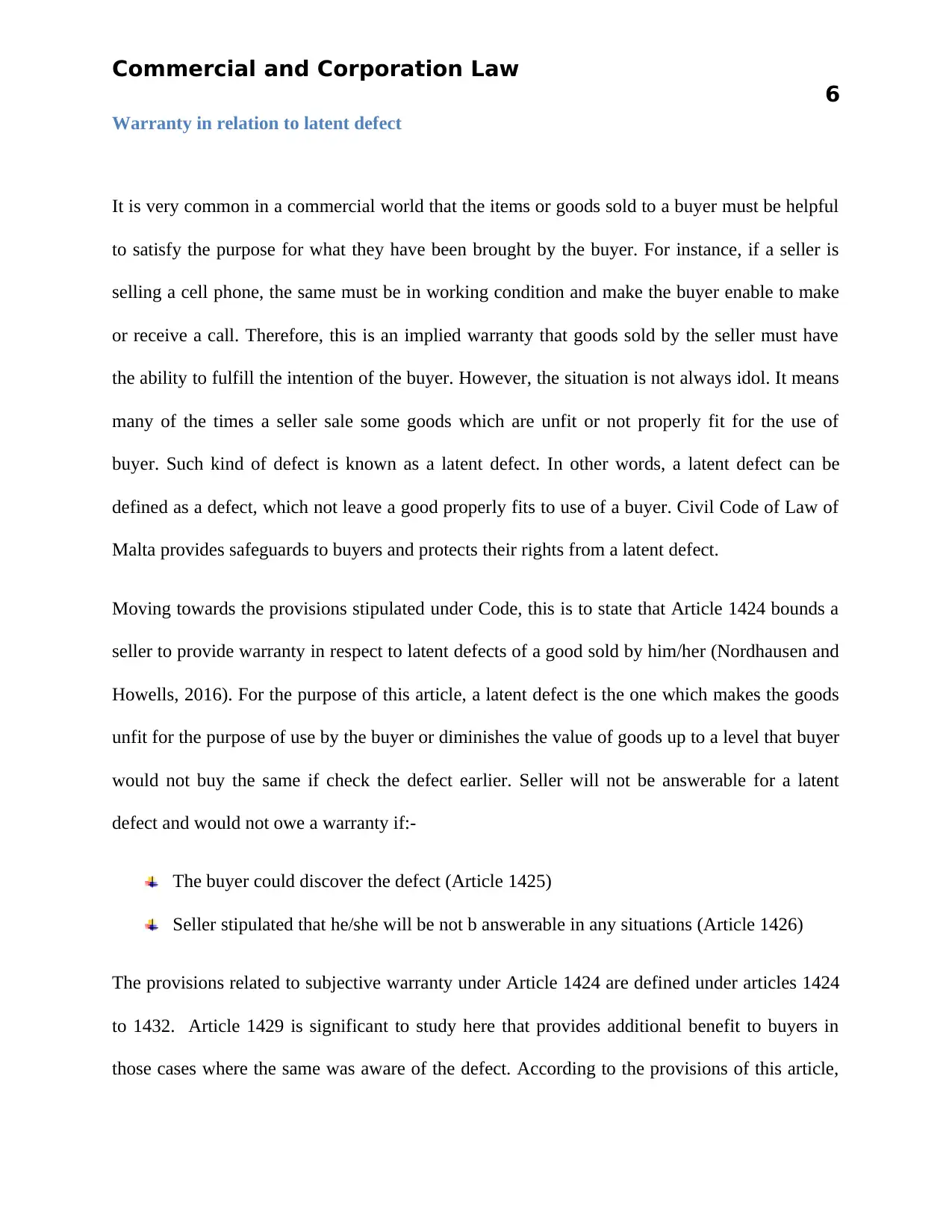
Commercial and Corporation Law
6
Warranty in relation to latent defect
It is very common in a commercial world that the items or goods sold to a buyer must be helpful
to satisfy the purpose for what they have been brought by the buyer. For instance, if a seller is
selling a cell phone, the same must be in working condition and make the buyer enable to make
or receive a call. Therefore, this is an implied warranty that goods sold by the seller must have
the ability to fulfill the intention of the buyer. However, the situation is not always idol. It means
many of the times a seller sale some goods which are unfit or not properly fit for the use of
buyer. Such kind of defect is known as a latent defect. In other words, a latent defect can be
defined as a defect, which not leave a good properly fits to use of a buyer. Civil Code of Law of
Malta provides safeguards to buyers and protects their rights from a latent defect.
Moving towards the provisions stipulated under Code, this is to state that Article 1424 bounds a
seller to provide warranty in respect to latent defects of a good sold by him/her (Nordhausen and
Howells, 2016). For the purpose of this article, a latent defect is the one which makes the goods
unfit for the purpose of use by the buyer or diminishes the value of goods up to a level that buyer
would not buy the same if check the defect earlier. Seller will not be answerable for a latent
defect and would not owe a warranty if:-
The buyer could discover the defect (Article 1425)
Seller stipulated that he/she will be not b answerable in any situations (Article 1426)
The provisions related to subjective warranty under Article 1424 are defined under articles 1424
to 1432. Article 1429 is significant to study here that provides additional benefit to buyers in
those cases where the same was aware of the defect. According to the provisions of this article,
6
Warranty in relation to latent defect
It is very common in a commercial world that the items or goods sold to a buyer must be helpful
to satisfy the purpose for what they have been brought by the buyer. For instance, if a seller is
selling a cell phone, the same must be in working condition and make the buyer enable to make
or receive a call. Therefore, this is an implied warranty that goods sold by the seller must have
the ability to fulfill the intention of the buyer. However, the situation is not always idol. It means
many of the times a seller sale some goods which are unfit or not properly fit for the use of
buyer. Such kind of defect is known as a latent defect. In other words, a latent defect can be
defined as a defect, which not leave a good properly fits to use of a buyer. Civil Code of Law of
Malta provides safeguards to buyers and protects their rights from a latent defect.
Moving towards the provisions stipulated under Code, this is to state that Article 1424 bounds a
seller to provide warranty in respect to latent defects of a good sold by him/her (Nordhausen and
Howells, 2016). For the purpose of this article, a latent defect is the one which makes the goods
unfit for the purpose of use by the buyer or diminishes the value of goods up to a level that buyer
would not buy the same if check the defect earlier. Seller will not be answerable for a latent
defect and would not owe a warranty if:-
The buyer could discover the defect (Article 1425)
Seller stipulated that he/she will be not b answerable in any situations (Article 1426)
The provisions related to subjective warranty under Article 1424 are defined under articles 1424
to 1432. Article 1429 is significant to study here that provides additional benefit to buyers in
those cases where the same was aware of the defect. According to the provisions of this article,
Paraphrase This Document
Need a fresh take? Get an instant paraphrase of this document with our AI Paraphraser
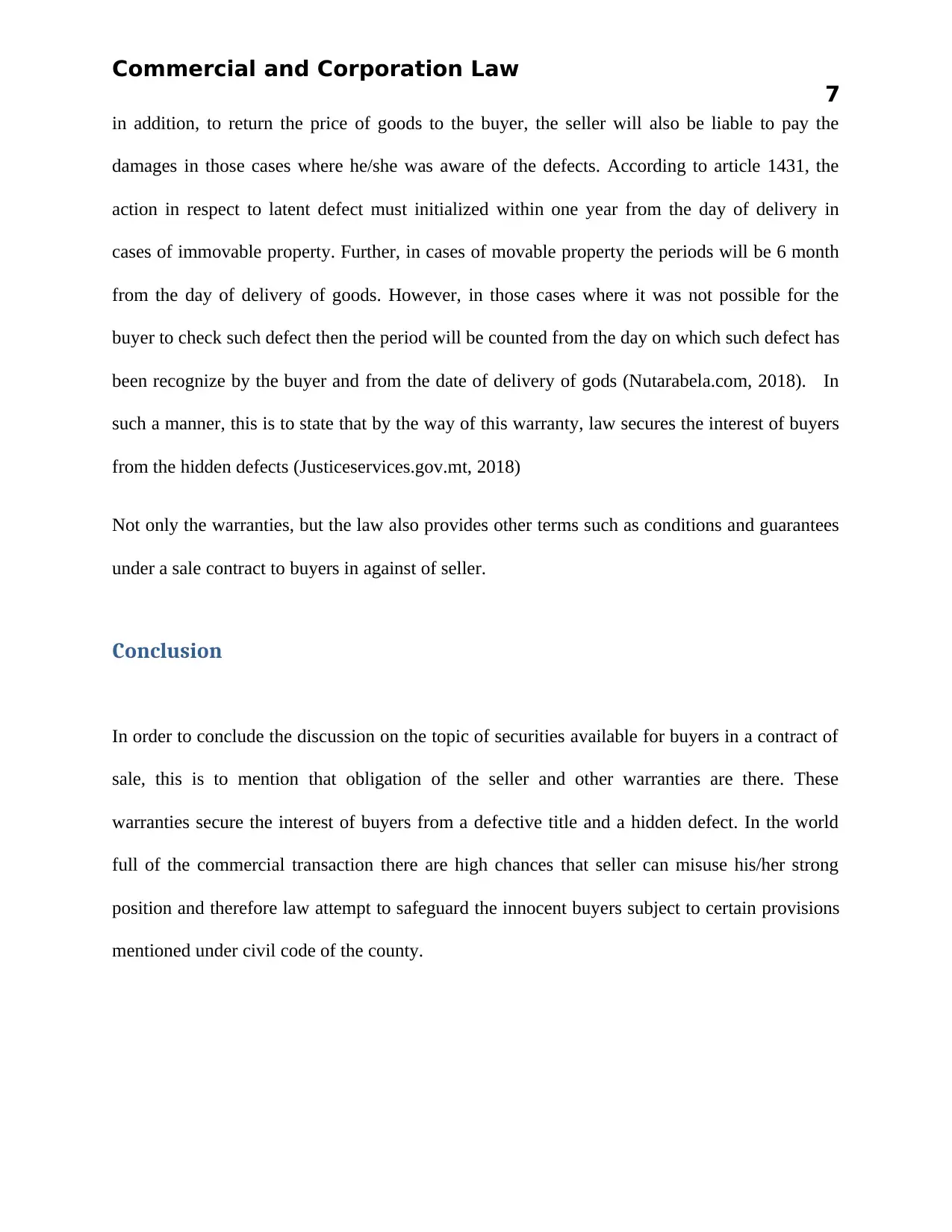
Commercial and Corporation Law
7
in addition, to return the price of goods to the buyer, the seller will also be liable to pay the
damages in those cases where he/she was aware of the defects. According to article 1431, the
action in respect to latent defect must initialized within one year from the day of delivery in
cases of immovable property. Further, in cases of movable property the periods will be 6 month
from the day of delivery of goods. However, in those cases where it was not possible for the
buyer to check such defect then the period will be counted from the day on which such defect has
been recognize by the buyer and from the date of delivery of gods (Nutarabela.com, 2018). In
such a manner, this is to state that by the way of this warranty, law secures the interest of buyers
from the hidden defects (Justiceservices.gov.mt, 2018)
Not only the warranties, but the law also provides other terms such as conditions and guarantees
under a sale contract to buyers in against of seller.
Conclusion
In order to conclude the discussion on the topic of securities available for buyers in a contract of
sale, this is to mention that obligation of the seller and other warranties are there. These
warranties secure the interest of buyers from a defective title and a hidden defect. In the world
full of the commercial transaction there are high chances that seller can misuse his/her strong
position and therefore law attempt to safeguard the innocent buyers subject to certain provisions
mentioned under civil code of the county.
7
in addition, to return the price of goods to the buyer, the seller will also be liable to pay the
damages in those cases where he/she was aware of the defects. According to article 1431, the
action in respect to latent defect must initialized within one year from the day of delivery in
cases of immovable property. Further, in cases of movable property the periods will be 6 month
from the day of delivery of goods. However, in those cases where it was not possible for the
buyer to check such defect then the period will be counted from the day on which such defect has
been recognize by the buyer and from the date of delivery of gods (Nutarabela.com, 2018). In
such a manner, this is to state that by the way of this warranty, law secures the interest of buyers
from the hidden defects (Justiceservices.gov.mt, 2018)
Not only the warranties, but the law also provides other terms such as conditions and guarantees
under a sale contract to buyers in against of seller.
Conclusion
In order to conclude the discussion on the topic of securities available for buyers in a contract of
sale, this is to mention that obligation of the seller and other warranties are there. These
warranties secure the interest of buyers from a defective title and a hidden defect. In the world
full of the commercial transaction there are high chances that seller can misuse his/her strong
position and therefore law attempt to safeguard the innocent buyers subject to certain provisions
mentioned under civil code of the county.
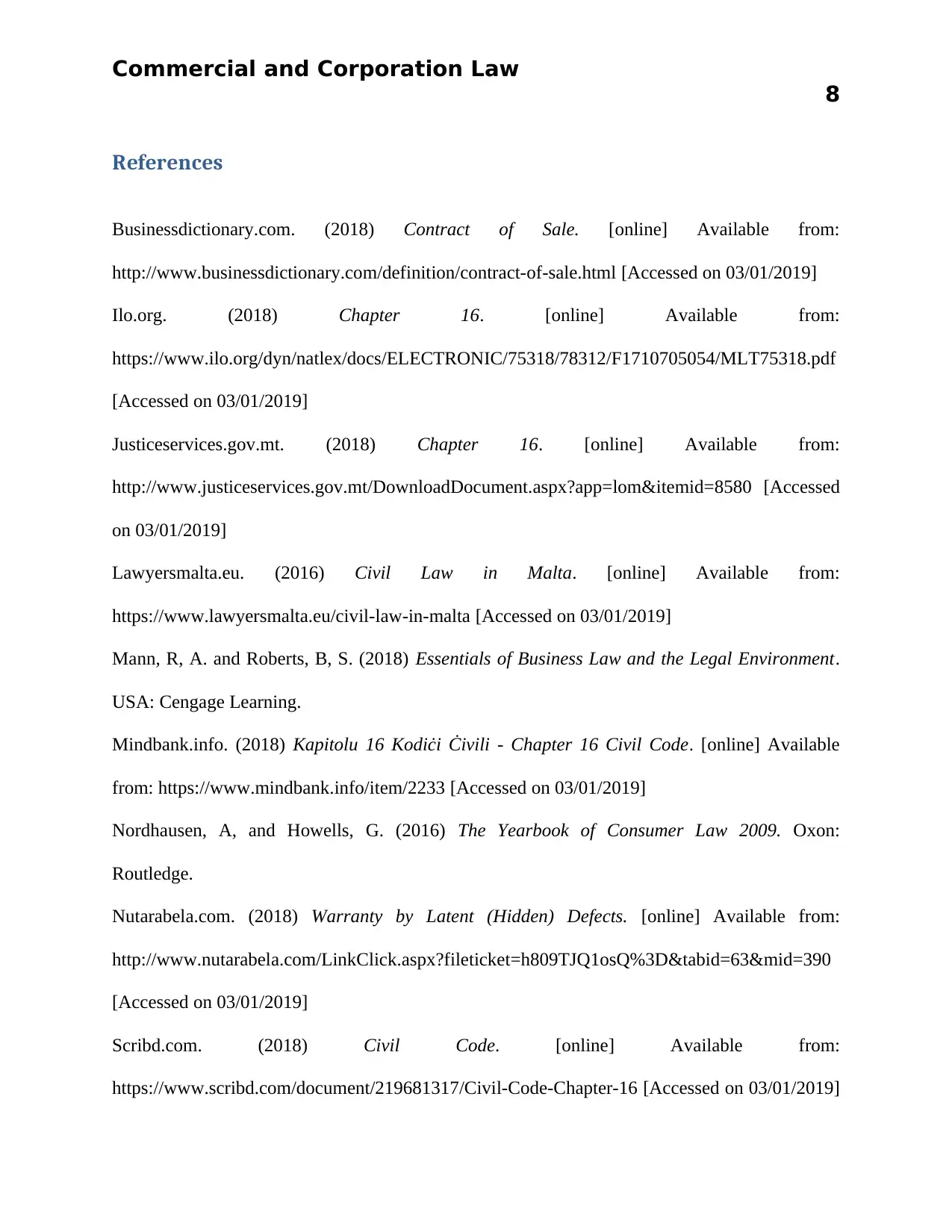
Commercial and Corporation Law
8
References
Businessdictionary.com. (2018) Contract of Sale. [online] Available from:
http://www.businessdictionary.com/definition/contract-of-sale.html [Accessed on 03/01/2019]
Ilo.org. (2018) Chapter 16. [online] Available from:
https://www.ilo.org/dyn/natlex/docs/ELECTRONIC/75318/78312/F1710705054/MLT75318.pdf
[Accessed on 03/01/2019]
Justiceservices.gov.mt. (2018) Chapter 16. [online] Available from:
http://www.justiceservices.gov.mt/DownloadDocument.aspx?app=lom&itemid=8580 [Accessed
on 03/01/2019]
Lawyersmalta.eu. (2016) Civil Law in Malta. [online] Available from:
https://www.lawyersmalta.eu/civil-law-in-malta [Accessed on 03/01/2019]
Mann, R, A. and Roberts, B, S. (2018) Essentials of Business Law and the Legal Environment.
USA: Cengage Learning.
Mindbank.info. (2018) Kapitolu 16 Kodiċi Ċivili - Chapter 16 Civil Code. [online] Available
from: https://www.mindbank.info/item/2233 [Accessed on 03/01/2019]
Nordhausen, A, and Howells, G. (2016) The Yearbook of Consumer Law 2009. Oxon:
Routledge.
Nutarabela.com. (2018) Warranty by Latent (Hidden) Defects. [online] Available from:
http://www.nutarabela.com/LinkClick.aspx?fileticket=h809TJQ1osQ%3D&tabid=63&mid=390
[Accessed on 03/01/2019]
Scribd.com. (2018) Civil Code. [online] Available from:
https://www.scribd.com/document/219681317/Civil-Code-Chapter-16 [Accessed on 03/01/2019]
8
References
Businessdictionary.com. (2018) Contract of Sale. [online] Available from:
http://www.businessdictionary.com/definition/contract-of-sale.html [Accessed on 03/01/2019]
Ilo.org. (2018) Chapter 16. [online] Available from:
https://www.ilo.org/dyn/natlex/docs/ELECTRONIC/75318/78312/F1710705054/MLT75318.pdf
[Accessed on 03/01/2019]
Justiceservices.gov.mt. (2018) Chapter 16. [online] Available from:
http://www.justiceservices.gov.mt/DownloadDocument.aspx?app=lom&itemid=8580 [Accessed
on 03/01/2019]
Lawyersmalta.eu. (2016) Civil Law in Malta. [online] Available from:
https://www.lawyersmalta.eu/civil-law-in-malta [Accessed on 03/01/2019]
Mann, R, A. and Roberts, B, S. (2018) Essentials of Business Law and the Legal Environment.
USA: Cengage Learning.
Mindbank.info. (2018) Kapitolu 16 Kodiċi Ċivili - Chapter 16 Civil Code. [online] Available
from: https://www.mindbank.info/item/2233 [Accessed on 03/01/2019]
Nordhausen, A, and Howells, G. (2016) The Yearbook of Consumer Law 2009. Oxon:
Routledge.
Nutarabela.com. (2018) Warranty by Latent (Hidden) Defects. [online] Available from:
http://www.nutarabela.com/LinkClick.aspx?fileticket=h809TJQ1osQ%3D&tabid=63&mid=390
[Accessed on 03/01/2019]
Scribd.com. (2018) Civil Code. [online] Available from:
https://www.scribd.com/document/219681317/Civil-Code-Chapter-16 [Accessed on 03/01/2019]
⊘ This is a preview!⊘
Do you want full access?
Subscribe today to unlock all pages.

Trusted by 1+ million students worldwide
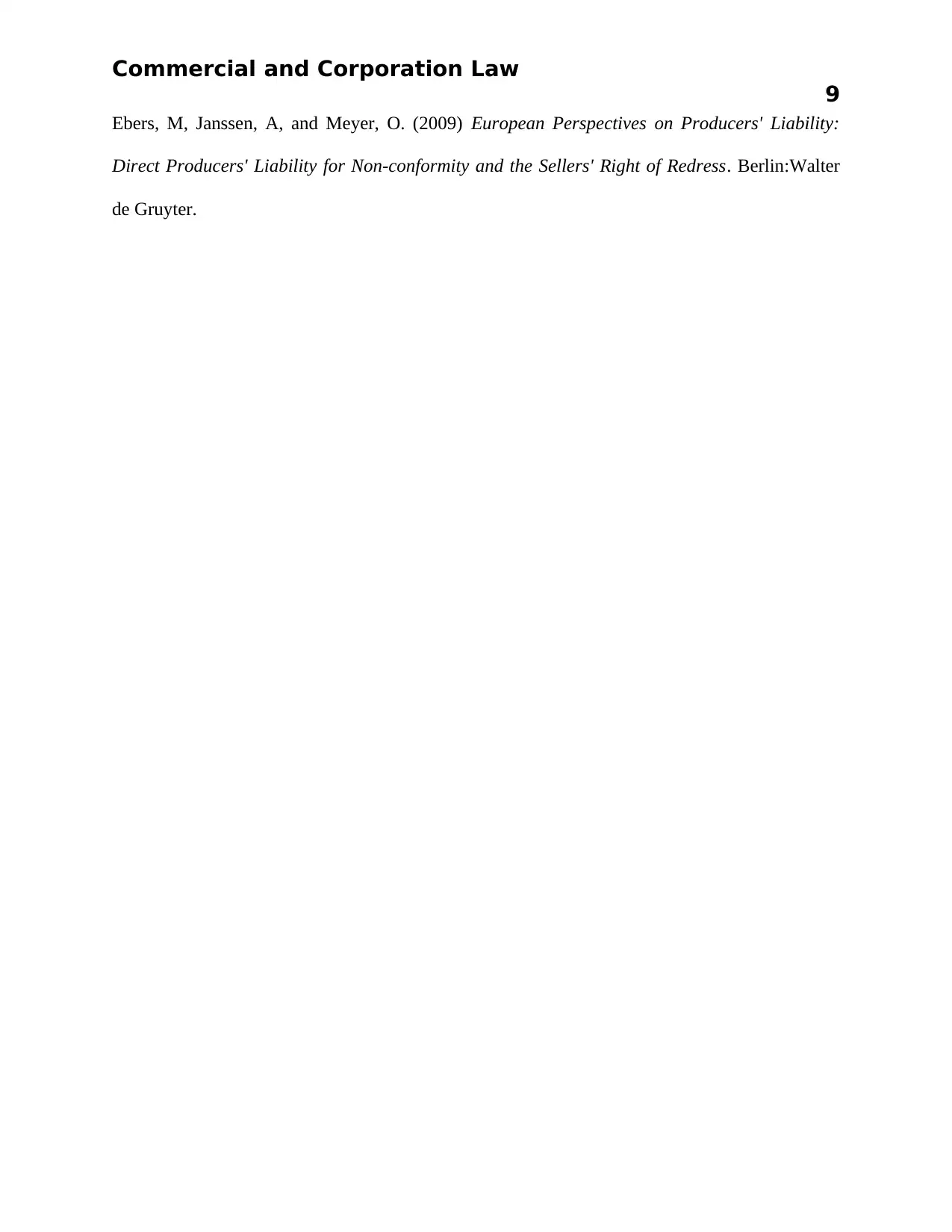
Commercial and Corporation Law
9
Ebers, M, Janssen, A, and Meyer, O. (2009) European Perspectives on Producers' Liability:
Direct Producers' Liability for Non-conformity and the Sellers' Right of Redress. Berlin:Walter
de Gruyter.
9
Ebers, M, Janssen, A, and Meyer, O. (2009) European Perspectives on Producers' Liability:
Direct Producers' Liability for Non-conformity and the Sellers' Right of Redress. Berlin:Walter
de Gruyter.
1 out of 10
Related Documents
Your All-in-One AI-Powered Toolkit for Academic Success.
+13062052269
info@desklib.com
Available 24*7 on WhatsApp / Email
![[object Object]](/_next/static/media/star-bottom.7253800d.svg)
Unlock your academic potential
Copyright © 2020–2026 A2Z Services. All Rights Reserved. Developed and managed by ZUCOL.





